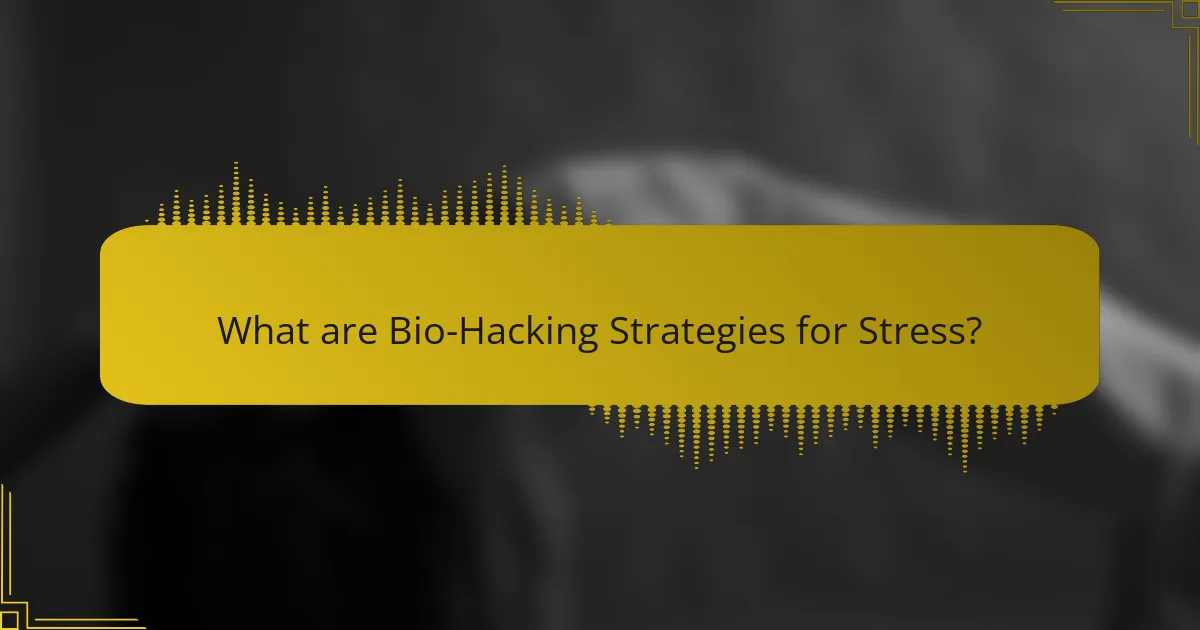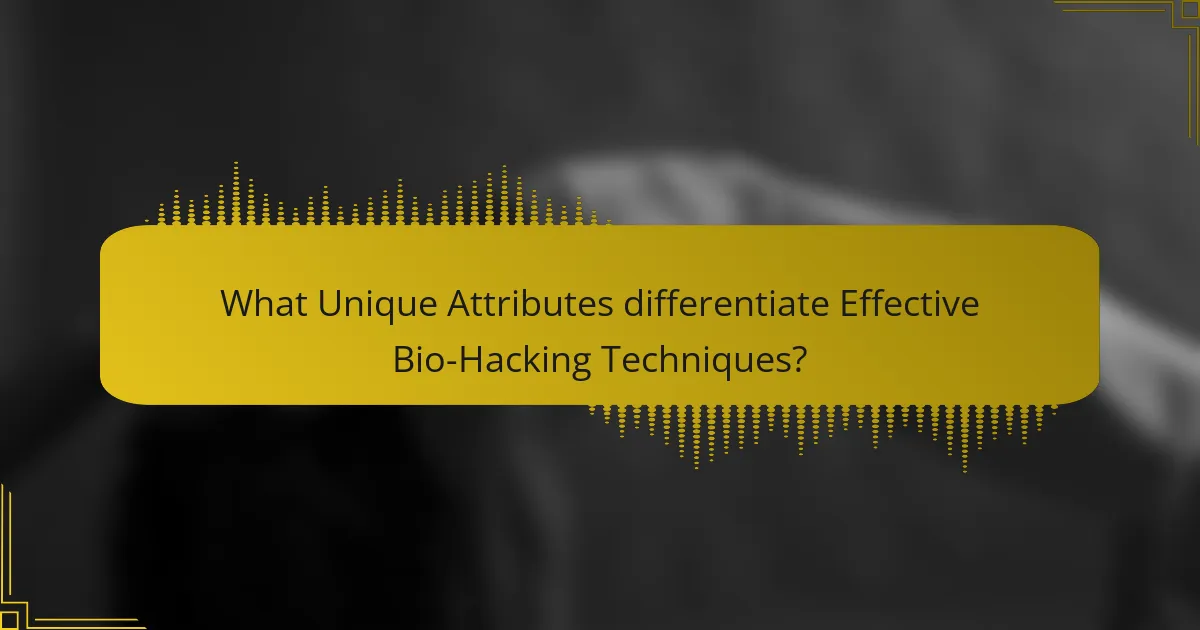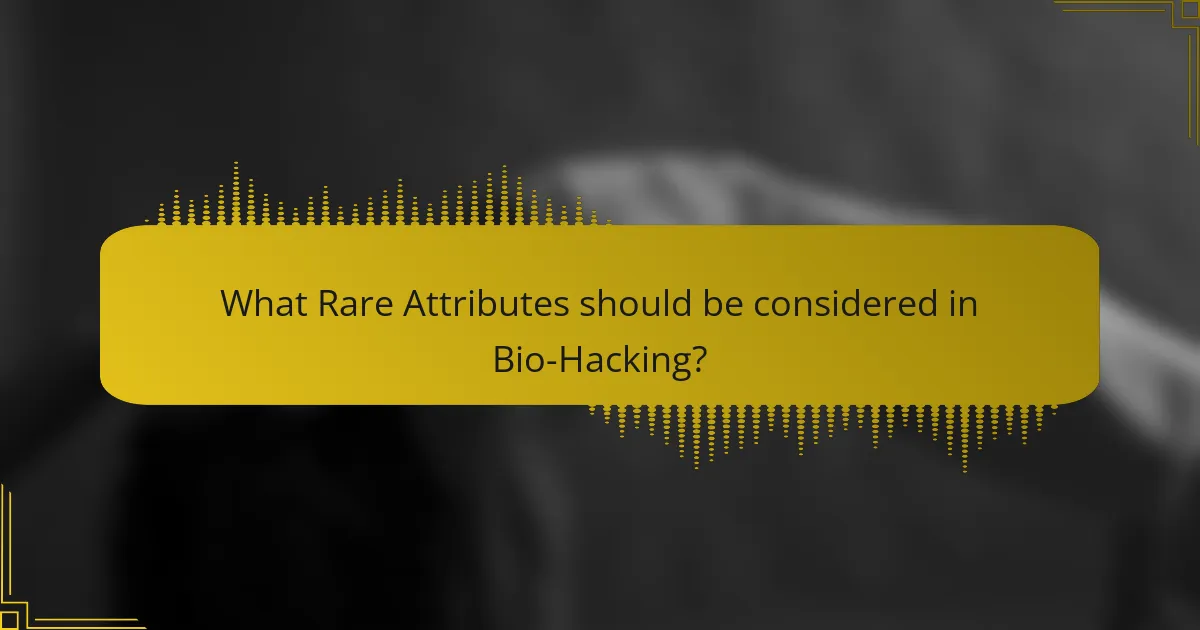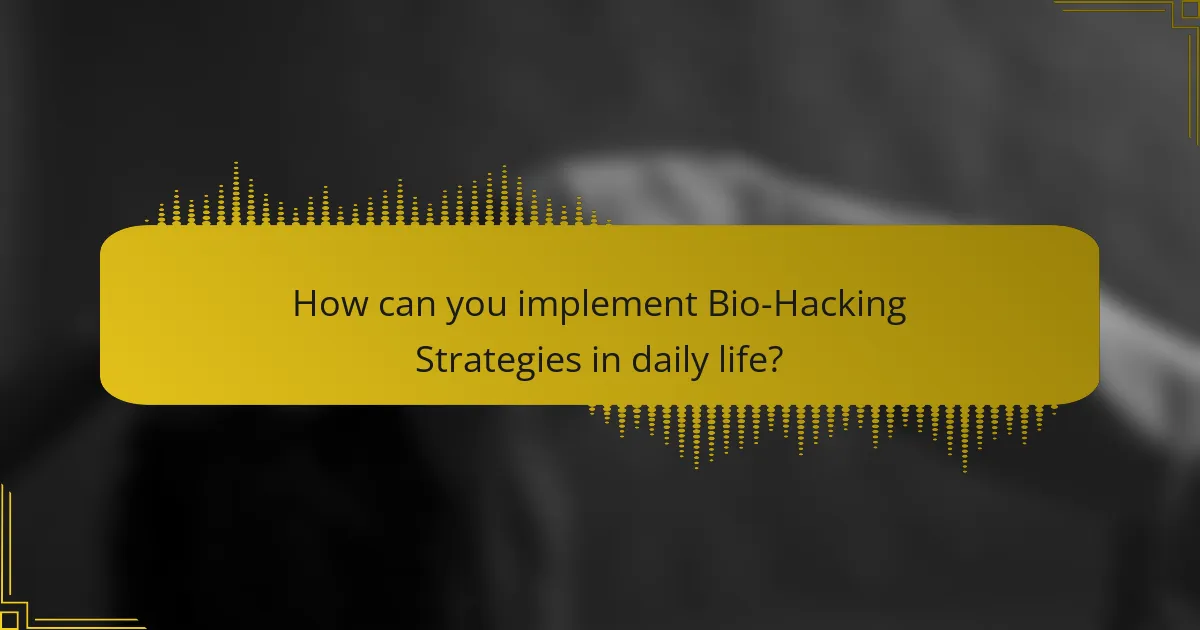Managing stress effectively is crucial for mental well-being. This article explores bio-hacking strategies that include mindful techniques, neuroplasticity exercises, and emotional resilience practices. Mindfulness promotes relaxation and focus, while neuroplasticity helps rewire the brain for better stress management. Emotional resilience practices build coping mechanisms against stressors, leading to lasting improvements in mental health.

What are Bio-Hacking Strategies for Stress?
Bio-hacking strategies for stress include mindful techniques, neuroplasticity exercises, and emotional resilience practices. These approaches enhance mental well-being and reduce stress levels effectively. Mindfulness techniques, such as meditation and deep breathing, promote relaxation and focus. Neuroplasticity exercises, like cognitive behavioural therapy, help rewire the brain for better stress management. Emotional resilience practices, including journaling and gratitude exercises, build coping mechanisms against stressors. Implementing these strategies can lead to lasting improvements in stress reduction and overall mental health.
How do Mind-Body Practices influence Stress Management?
Mind-body practices significantly enhance stress management by promoting emotional resilience and neuroplasticity. Techniques such as mindfulness meditation and yoga activate the relaxation response, reducing cortisol levels. Research indicates that regular practice can lead to structural brain changes, enhancing one’s ability to cope with stress. These practices foster a greater awareness of thoughts and emotions, ultimately leading to improved emotional regulation and resilience.
What role does Neuroplasticity play in Stress Reduction?
Neuroplasticity plays a crucial role in stress reduction by enabling the brain to adapt and reorganize itself in response to experiences. This adaptability allows individuals to develop healthier thought patterns and emotional responses to stressors. Techniques such as mindfulness meditation can enhance neuroplasticity, fostering emotional resilience. Research indicates that consistent practice can lead to structural changes in the brain, improving stress management capabilities.
How can Emotional Resilience be enhanced through Bio-Hacking?
Emotional resilience can be enhanced through bio-hacking by employing mindful techniques and leveraging neuroplasticity. Mindfulness practices, such as meditation and deep breathing, reduce stress responses and promote emotional regulation. Neuroplasticity allows the brain to form new connections, enabling individuals to reshape their emotional responses over time. Techniques like cognitive behavioural therapy (CBT) and gratitude journaling can further strengthen emotional resilience by fostering positive thinking patterns. Regular physical activity and proper nutrition also contribute to improved mental health, reinforcing the body’s stress response system.

What are the Universal Benefits of Mindful Techniques?
Mindful techniques offer universal benefits that enhance emotional resilience and promote neuroplasticity. These practices reduce stress, improve focus, and foster a greater sense of well-being. Mindfulness encourages self-awareness, allowing individuals to respond to stressors with clarity rather than reactivity. Regular engagement in mindful techniques can lead to lasting changes in brain structure, supporting emotional regulation and mental health. As a result, practitioners often experience enhanced coping strategies and improved overall quality of life.
How do Mindfulness and Meditation reduce Stress?
Mindfulness and meditation effectively reduce stress by promoting relaxation and enhancing emotional regulation. These techniques activate the parasympathetic nervous system, lowering cortisol levels. Neuroplasticity plays a key role; regular practice reshapes brain pathways, improving stress response. Studies show that consistent mindfulness practice increases emotional resilience, enabling better coping strategies during stressors.
What are the physiological effects of Breathing Exercises?
Breathing exercises enhance physiological well-being by reducing stress and improving emotional resilience. These techniques lower heart rate and blood pressure, promote relaxation, and increase oxygen flow to the brain. As a result, they support neuroplasticity by fostering adaptive changes in brain function. Regular practice can lead to a unique attribute of heightened emotional regulation, enabling individuals to manage stress more effectively.
How can Yoga improve Emotional Well-being?
Yoga enhances emotional well-being by promoting mindfulness, reducing stress, and fostering emotional resilience. Practicing yoga activates neuroplasticity, allowing the brain to adapt positively to stressors. Regular yoga sessions can lower cortisol levels, improve mood, and increase self-awareness. As a result, individuals often experience greater emotional stability and improved coping mechanisms.

What Unique Attributes differentiate Effective Bio-Hacking Techniques?
Effective bio-hacking techniques are distinguished by their focus on neuroplasticity, emotional resilience, and mindfulness. These unique attributes enhance stress management by promoting brain adaptability and emotional strength. Neuroplasticity allows individuals to rewire their thought patterns, fostering healthier responses to stress. Mindful techniques cultivate present-moment awareness, reducing anxiety and improving emotional regulation. Emotional resilience equips individuals with the ability to bounce back from stressors, ensuring long-term mental well-being. Together, these attributes create a comprehensive approach to stress bio-hacking.
What specific Mind-Body Practices are most effective for Stress?
Mind-body practices such as mindfulness meditation, yoga, tai chi, and deep breathing exercises are effective for stress management. These techniques enhance emotional resilience by promoting relaxation and improving neuroplasticity, which helps the brain adapt to stress. Mindfulness meditation reduces anxiety and fosters a sense of calm. Yoga combines physical movement with breath control, enhancing overall well-being. Tai chi offers gentle movement that reduces stress while improving balance. Deep breathing exercises activate the body’s relaxation response, lowering heart rate and blood pressure. Incorporating these practices into daily routines can significantly alleviate stress levels.
How does Personalization enhance Bio-Hacking strategies?
Personalization enhances bio-hacking strategies by tailoring techniques to individual needs, improving effectiveness. Personalized approaches in stress management can increase engagement and motivation, leading to better outcomes in mindful techniques and emotional resilience. For instance, neuroplasticity benefits from customized practices that resonate with personal experiences, fostering deeper connections and lasting change. As a result, individuals can develop unique routines that align with their stressors, enhancing overall well-being.
What are the cutting-edge tools for measuring Stress Levels?
Wearable devices, mobile apps, and biofeedback tools are cutting-edge tools for measuring stress levels. These technologies provide real-time data on physiological indicators like heart rate variability and cortisol levels.
Wearable devices such as smartwatches monitor heart rate and sleep patterns, offering insights into stress responses. Mobile apps utilize self-reported data and mindfulness exercises to track emotional states. Biofeedback tools allow users to visualize stress responses, promoting awareness and regulation of stress levels.
The integration of neuroplasticity techniques enhances these tools by fostering emotional resilience through targeted interventions. As a result, users can effectively manage stress and improve overall mental well-being.

What Rare Attributes should be considered in Bio-Hacking?
Bio-hacking strategies for stress should consider rare attributes like personalized neurofeedback, biofield tuning, and the integration of epigenetic insights. These elements enhance emotional resilience by tailoring techniques to individual biological responses. Personalized neurofeedback offers real-time brain activity monitoring, allowing users to optimize mental states. Biofield tuning utilizes sound frequencies to balance energy fields, promoting relaxation. Epigenetic insights provide understanding of how lifestyle changes can influence gene expression related to stress and resilience.
What are the lesser-known Mind-Body Techniques for Stress Relief?
Breathwork, somatic experiencing, and emotional freedom techniques are lesser-known mind-body techniques for stress relief. These methods focus on enhancing emotional resilience and neuroplasticity through awareness and physical sensations.
Breathwork involves controlled breathing patterns to reduce anxiety and promote relaxation. Research indicates that it can lower cortisol levels, enhancing stress management. Somatic experiencing emphasizes body awareness to release trauma and tension. This technique fosters a deeper connection between mind and body, facilitating emotional healing. Emotional freedom techniques, or tapping, combine cognitive and physical strategies to alleviate stress by addressing emotional blockages.
Incorporating these techniques into daily routines can improve overall well-being and support bio-hacking strategies for stress management.
How can advanced Neurofeedback contribute to Stress Management?
Advanced Neurofeedback significantly enhances stress management by promoting emotional resilience and neuroplasticity. It trains the brain to regulate its activity, leading to reduced anxiety and improved mood. Research indicates that consistent Neurofeedback sessions can lower cortisol levels, a key stress hormone. This technique fosters a state of mindfulness, allowing individuals to better respond to stressors. By rewiring neural pathways, it empowers users to develop healthier coping mechanisms over time.
What unique case studies illustrate successful Bio-Hacking for Stress?
Case studies demonstrate that bio-hacking strategies like mindfulness, neuroplasticity, and emotional resilience effectively reduce stress. One notable example is a corporate wellness program that integrated mindfulness meditation. Employees reported a 30% decrease in stress levels after consistent practice over three months. Another case involved a neuroplasticity workshop where participants learned cognitive restructuring techniques. Follow-up assessments indicated improved emotional resilience and a significant reduction in anxiety symptoms. These cases highlight the practical application of bio-hacking for stress management, showcasing measurable benefits in real-world settings.

How can you implement Bio-Hacking Strategies in daily life?
To implement bio-hacking strategies for stress, focus on mindful techniques, neuroplasticity, and emotional resilience. Start by practicing mindfulness through meditation or deep breathing exercises, which enhance awareness and reduce stress. Incorporate neuroplasticity by challenging your brain with new activities, fostering adaptability and resilience. Lastly, build emotional resilience by maintaining a supportive social network and engaging in regular physical activity, which can improve mood and stress management.
What are the best practices for integrating Mindful Techniques?
To effectively integrate mindful techniques into bio-hacking strategies for stress, focus on consistent practice and personalization. Start with mindfulness meditation to enhance emotional resilience, aiming for daily sessions of at least 10 minutes. Incorporate neuroplasticity exercises, such as gratitude journaling, to reshape thought patterns. Use breathing techniques to manage stress in real-time, and ensure to adapt practices to fit individual preferences and lifestyles. Regularly assess progress to refine techniques for optimal results.
What common mistakes should you avoid in Bio-Hacking?
To avoid common mistakes in bio-hacking for stress, focus on mindful techniques, neuroplasticity, and emotional resilience. Many individuals overlook the importance of consistency in practice, which is vital for achieving desired results. Neglecting to track progress can lead to misinterpretation of effectiveness, while ignoring personal limits may result in burnout. Additionally, relying solely on one technique without integrating various strategies can hinder overall growth. Finally, failing to educate oneself on the science behind these methods can lead to ineffective practices and wasted effort.
How can you optimize your approach to enhance Emotional Resilience?
To enhance emotional resilience, adopt bio-hacking strategies that incorporate mindful techniques and neuroplasticity. Practice mindfulness meditation to reduce stress and increase awareness. Engage in cognitive exercises that promote neuroplasticity, such as journaling or learning new skills. Establish a support network to share experiences and foster emotional growth. Regular physical activity and proper nutrition also contribute to overall emotional well-being.